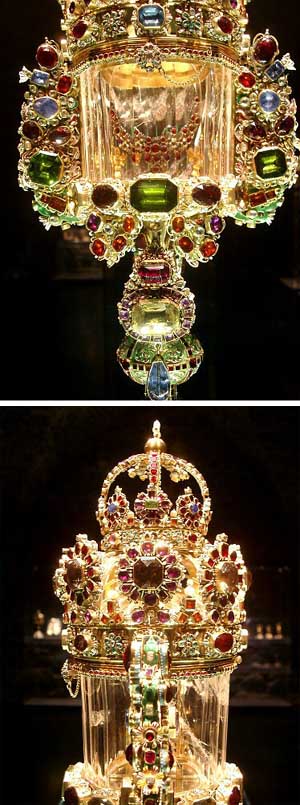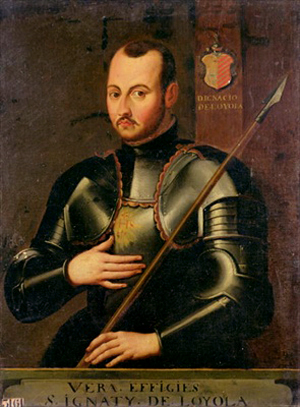 |
Special Devotions
Comments on a Meditation of St. Ignatius - V
The Value and Efficacy of the Holy Eucharist
Plinio Corrêa de Oliveira
St. Ignatius concludes his meditation on the gift of the Holy Eucharist that Christ gave to man (see Parts 1, 2, 3, & 4) by analyzing the usefulness of the gift. He says: “Consider the usefulness of this gift of the Holy Eucharist. It is called Communion to signify that it makes all the goods of Christ available to men. That is, that colossal capital of merit that comes from His life and death is fully applied in this Divine Sacrament. In it, Our Lord wishes to accomplish in each particular person the same effects that His Passion produced for the entire world.”

Two partial views of a precious monstrance, Cathedral of Vienna; top, its front, bottom, its lateral |
This is another very elevated thought. Imagine you were at the foot of the Cross, or imagine yourself at the foot of a crucifix. You are considering the Blood that Our Lord shed. You could pray: “My Lord, let one drop of that Blood fall on me and transform me.” This would be a beautiful and appropriate prayer. However, a Communion is much more that this. I should remember that at the hour of the Communion, all the merits of Our Lord Jesus Christ are offered for me.
Therefore, I should go to Communion with confidence, because those merits obtain pardon for my sins, cleansing my soul. Since the Blood of Christ can do everything and I am receiving the Blood of Christ in the Holy Eucharist, I am receiving the solution for all my problems and the remedy for all my iniquities. Thus, if I pray and reflect on this when I go to Communion, those merits will apply to me.
I should ask Our Lady: “My Mother, grant that the merits of your Son be applied to me as they were to you, so that my soul might be continuously persuaded of their efficacy.”
A man becomes a spiritual millionaire through the merits of one simple Communion. If he were to spend his whole life in a cave alone praying and doing penance, he would not acquire such great merit as he acquires in one Communion. This is the value of one Communion. Thus we can understand how priceless this gift is. This is the usefulness of the Holy Eucharist for us.
Prayers of thanksgiving
St. Ignatius ends with a simple thought: “O God, after considering all this, what can I deny You? After seeing such great gifts that You give me, how can I refuse You anything?”
He suggests a prayer to Our Lord in the Blessed Sacrament be said at the end of the Communion. We, who are slaves of Our Lady according to the method of St. Louis Grignion de Montfort, should say the prayer through Our Lady, asking Our Lord to grant us the gift of giving everything to Him.
It would also be very beautiful to end our Communion with the prayer of St. Nicolaus of Flue: “My God, give me everything that unites me to You, and take from me everything that separates me from You.” It is a way to unite ourselves completely with Him.
St. Ignatius has a series of very beautiful ejaculations that apply very well to this meditation. It is the Anima Christi [Soul of Christ], which you have all certainly read: Anima Christi, sanctifica me, Corpus Christi, salva me, Sanguis Christi, inebria me [Soul of Christ, sanctify me, Body of Christ save me, Blood of Christ, inebriate me] etc
What does this line mean: “Blood of Christ, inebriate me?” Holy Communion, which is the Blood of Christ, gives us a spiritual lucidity that takes us beyond the realm of ordinary realities. Unlike the inebriation from wine that leads us to a false reality, the inebriation of the Holy Ghost brings us to the summit of the possession of truth, the apex of the knowledge of the revealed truth of the Catholic Religion. This is the chaste inebriation of the Holy Ghost that we should ask for when we receive the Holy Eucharist.
Another line that St. Ignatius proposes we pray is this: Aqua lateris Christi, lava me [Water from the side of Christ, wash me]. What does it mean? We should ask that that water from the side of Christ that flowed at the end of His Passion fall on us and wash us. You know the pious tradition that tells how the centurion Longinus, who was almost blind, pierced the side of Our Lord with his lance. As he pierced Our Lord’s Heart, water fell over his face and eyes and healed his blindness.
Thus, we can say to Our Lord: “I am almost blind to the things of God. I hear the things of God, but I do not understand them. I cannot see them well. My God, make the blood and water from Your side fall on my eyes and remove their scales. Through Our Lady, I beg You, hear my prayer and make me see all the marvels of God’s truth.”
The Church's broad horizons
Actually, we should accustom our eyes to the great dimensions of the Catholic Religion. The supernatural reality is always around us. Since we are sons of God, we must accustom our sight to the immense perspectives of God. We cannot live in mediocrity. In face of the grand panoramas of our vocation, our defects – either those tending toward mediocrity or megalomania – make us rebel.

St. Ignatius: a magnificent meditation on the Eucharist |
Yes, our tendencies toward pride also make us rebel. The man who is proud rebels against being small before God. One of the most extraordinary men who ever lived was St. Thomas Aquinas. Before the Holy Eucharist, however, he became small, as his hymn Pange Lingua expresses well. He humbled himself to insignificant proportions before the Holy Sacrament.
If this great Saint did so, how can a megalomaniac pretend that he is a great man and the center of everything? He either has to humble himself or he will revolt. If he humbles himself, he receives a grace that speaks to him thus: “No, you are not the center of everything, but you are a great beneficiary of everything that was given to you in the Eucharist. You are great because of the gifts you received. The greatest of them is to have the Blessed Sacrament. So, now give thanks and correspond to these gifts.”
Thus, in our Communions let us ask for the grace of being cured of the blindness that comes from both mediocrity and megalomania.
At the same time, let us remain confident that God, who is infinite, looks with great affection at the soul of each one of us, so small in comparison to Him. He sees in every single soul a miniature of Himself, a soul made in His likeness. He is charmed to come to a soul that is an image of Him. It is with this love that He awaits us.
In closing, I recommend going before a statue of Our Lady and praying three Hail Marys, asking that our next Communion be filled with confidence, joy and seriousness.

Taken from the personal records of Atila S. Guimarães,
Summarized and translated for TIA’s site
Posted August 15, 2011

Related Topics of Interest
 Our Lord’s Affection in Giving Us the Eucharist Our Lord’s Affection in Giving Us the Eucharist
 The Magnitude of the Gift of the Holy Eucharist The Magnitude of the Gift of the Holy Eucharist
 Our Debt of Gratitude to the Eucharist Our Debt of Gratitude to the Eucharist
 ‘Be Confounded by Your Ingratitude’ ‘Be Confounded by Your Ingratitude’
 Eucharistic Desecration in Costa Rica Eucharistic Desecration in Costa Rica
 Eucharistic Scandal in Italy Eucharistic Scandal in Italy
 Mother Teresa, a Eucharistic Minister Mother Teresa, a Eucharistic Minister
 Desecration of the Holy Eucharist by Adopting Large Hosts Desecration of the Holy Eucharist by Adopting Large Hosts

Related Works of Interest
|
|
Special Devotions | Religious | Home | Books | CDs | Search | Contact Us | Donate

© 2002- Tradition in Action, Inc. All Rights Reserved
|
 |
|